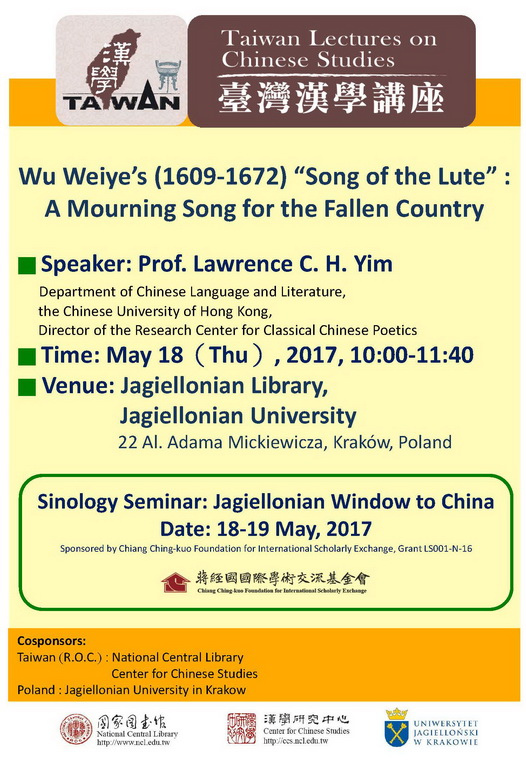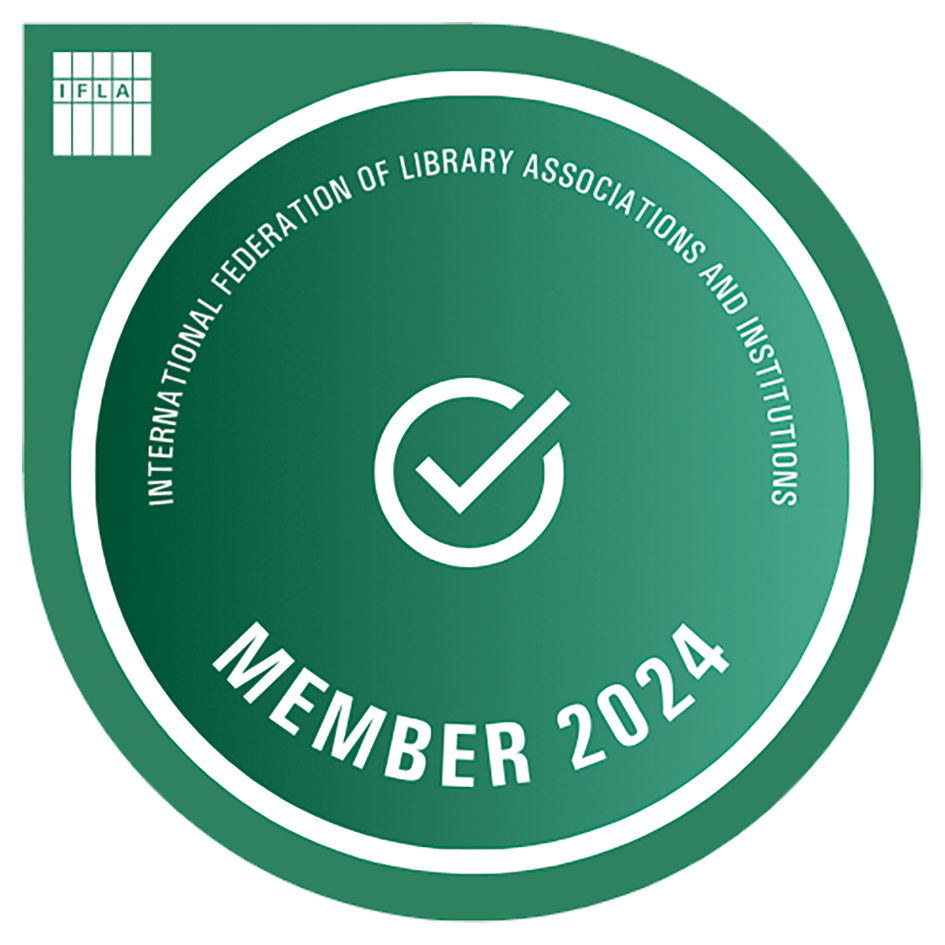歷次消息
- 2017-04-19
國家圖書館每年於海外自2012年起於海外設立「臺灣漢學資源中心」(Taiwan Resource Center for Chinese Studies,簡稱TRCCS),選擇國外重點大學或研究機構設置,加強與各國漢學研究單位合作,推動海內外漢學學術交流,傳布臺灣漢學學術成果,共同建置全球漢學研究資源與訊息平臺。
為推廣國際學術交流,彰顯臺灣研究成果,每年亦於海外舉辦6至8場講座,邀請重要學者,蒞臨TRCCS 合作館演講。今年為慶祝本館於波蘭亞捷隆大學 (Jagiellonian University)設置TRCCS屆滿周年,雙方及蔣經國國際學術交流基金會將於5月18日至19日舉辦 Jagiellonian Window on China 學術研討會。會中除邀請本館曾淑賢館長擔任開幕演講,講題為Digital Curation for Cultural and Intellectual Assets—Recent Efforts of the National Central Library。活動另安排今年第二場臺灣漢學講座,邀請香港中文大學嚴志雄教授,主講Wu Weiye's (1609-1672) "Song of the Lute": A Mourning Song for the Fallen Country (吳偉業〈琵琶行〉中之哀悼亡明與自我懺悔)。更多有關活動內容,本館將於近期介紹。
相關網址: http://www.japonistyka.io.filg.uj.edu.pl/aktualnosci/-/journal_content/56_INSTANCE_H89c/10368787/136223657
講題:吳偉業〈琵琶行〉中之哀悼亡明與自我懺悔(WuWeiye’s (1609-1672) “Song of the Lute”: A Mourning Song for the Fallen Country)
時間:2017年5月18日(週四)10:00
主講人:嚴志雄教授(香港中文大學中國語言及文學系教授暨中國古典詩學研究中心主任)
地點:JagiellonianLibrary, 22 Al. Adama Mickiewicza, Kraków, Poland
主辦單位:國家圖書館、漢學研究中心、波蘭亞捷隆大學。
摘要:
清順治二年 (1645) 五月,南明弘光朝土崩瓦解,吳偉業(梅村,1609-1672)攜家人百口避難長洲礬清湖浹月,後逼於時勢,返里。三年季春,因緣和合,梅村作〈琵琶行〉,乃其於南明朝覆亡後「梅村體」敘事歌行之初試,而膾炙人口至今。由夜聽琵琶而及明崇禎朝覆亡之痛史,〈琵琶行〉乃梅村「史詩」之大手筆、「歷史創傷」的展現。梅村之〈琵琶行〉乃太倉南園夜奏琵琶的詩性再現,也是梅村通過琵琶演奏以及江南音樂發展的情況,對晚明江南文化的愉悅、耽溺與墮落所作的、誠懇的凝視與內省,內裡滿載著自我反思、自我批判、自我懺悔之情。
這個「反思-批判-懺悔」的話語在詩中由一系列與「南」有關的意象及其喻意陸續、相互築構而成;與此江南隱喻系統相對的是「北」。相對於「南」,這個「北」的象喻系統在內涵上其實比較貧乏,沒有充分開展。循此思之,可見梅村念茲在茲的是「江南」,而「北」,其幌子耳。
梅村似謂晚明以降江南之「樂」(兼音樂、逸樂二讀)盛行、橫流,「江湖滿地〈南鄉子〉」,導致「盡失傳頭誤後生」。既然〈琵琶行〉的內核是「先帝十七年以來事」,那麼,梅村通過「江南樂」、「南鄉子」所反思與批判的,就某一意義言,就是江南文人、社群、地方文化、文化性格與國家命運、政治、歷史的關係。要言之,明清改朝換代,「換羽移宮」,百姓淪為「相對苦南冠」之人,江南文化難辭其咎。
Abstract:
Inmid-1645, as the Hongguang court of the Southern Ming dynasty crumbled intodust, Wu Weiye (Meicun, 1609–1672) took refuge with his whole family in LakeFanqing, Changzhou. After two long, worrisome months, the Wu family returnedhome. In late spring of the succeeding year (Shunzhi 3, 1646), Wu wrote “Pipaxing” (Song of the Lute). Composed in Wu’s celebrated “Meicun Style,” thisnarrative, lyrical and figurative poem in ballad form has been lauded as one ofWu’s most important and successful poems.
An engagingperformance of the lute in a spring evening moved Wu to tears and to write“Song of the Lute,” which tells the sad story of the last emperor, Chongzhen,of the Ming dynasty. “Song of the Lute” is regarded as shishi (poetic history),infused with historical trauma. Much attention has been paid to therelationship between Wu’s poem and the one bearing the same title by hispredecessor, the Tang poet Bai Juyi. While this is enlightening, there areother aspects of Wu’s poem that merit further examination.
Thistalk argues that the first and the last sections of Wu’s poem consist of anuanced dialogue in which the doomed fate of the late Ming is played out interms of the differences between the Southern and Northern cultures. Here inthe poem, Wu muses on the music, culture, and living style of late-MingJiangnan, which are regrettably seen as elements contributing to the demise ofthe Ming house. “Song of the Lute” tenderly expresses a sense ofself-criticism, and can be considered as a confession of guilt.
講者簡介:
嚴志雄教授,美國耶魯大學博士,現任香港中文大學中國語言及文學系教授暨中國古典詩學研究中心主任 ;曾任臺灣中央研究院中國文哲研究所研究員、國立清華大學中國文學系合聘教授。嚴教授專研明清文學與文化、明清詩文、文學理論等,著有專書 The Poet-historian QianQianyi (2009)、《錢謙益〈病榻消寒雜咏〉論釋》(2012)、《秋柳的世界——王士禛與清初詩壇側議》(2013),發表研究錢謙益、吳偉業、王士禛、屈大均、函可、東北流放詩人等中英文論文多篇,並編有《千山詩集》(2008)、《明清詩文研究(第1輯)》(2011) 等。嚴教授曾榮獲臺灣中央研究院「人文及社會科學學術性專書獎」(2014)、科技部「傑出研究獎」(2014) 等多個獎項。
About the Speaker:
Professor Lawrence Yim is an acclaimed authorityon Chinese poetry of the late imperial period (Ming-Qing) with research andteaching strengths in a broad range of genres and periods. His books include: The Poet-historian Qian Qianyi (Routledge, 2009), Qian Qianyi “Bingta xiaohan zayong” lunxi 錢謙益〈病榻消寒雜咏〉論釋 (A Study of Qian Qianyi’s “Forty-sixMiscellaneous Poems to Dispel Cold on My Sickbed”) (Linking, 2012), and Qiuliu de shijie—Wang Shizhen yu Qingchushitan ceyi 秋柳的世界——王士禛與清初詩壇側議 (The Poetic World of Autumn Willows: Wang Shizhenand Early Qing Poetry) (HKU Press, 2013). Professor Yim is currently Professorof Chinese Literature, Department of Chinese Language and Literature, theChinese University of Hong Kong, and Director of the Research Centre for Classical Chinese Poetics atthe same University. He was formerlyResearch Fellow of Academia Sinica and Professor of National Tsing HuaUniversity in Taiwan.
- 資源查詢
- 公告資訊
- 關於本館
- 讀者服務
- 申辦服務
- 其他網頁連結




